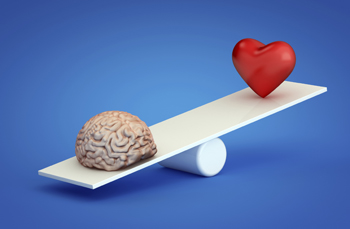It can tell people a lot about your decision-making process. Obviously, advertising is one area. Messages targeted at people with independent self-construals (your head tells you buying this car is the right decision because it has good value) will work better for those people than messages targeted at people with interdependent self-construals (Your heart tells you buying this car is the right decision because it has the highest safety ratings for families.)
For a new paper, eight studies explored the antecedents and consequences of whether people locate their sense of self in the brain or the heart. The hypothesis was that although people generally tend to locate their sense of self in the brain, this preference is significantly stronger for people with an independent self-construal than for people with an interdependent self-construal.

Credit: thinkstockphotos.com/Rice University
People with an independent self-construal tend to assert the autonomous nature of the self, realize their internal attributes and influence their environment. In pursuit of these self-relevant goals, these people often engage in thoughts, conversations and behaviors that are conceptually related to the brain. In contrast, people with an interdependent self-construal tend to be part of a group, maintain harmonious relationships and adjust to others. In pursuit of these self-relevant goals, these people often engage in thoughts, conversations and behaviors that are conceptually related not only to the brain, but also to the heart.
Participant groups ranged in size from 95 to 156 people between the ages of 20 and 40; about half the participants were women and half were men. The majority of participants were Americans. The study included a group of Indians, a cultural group that tends to have interdependent self-construals.
In the first study, participants were told that a person’s identity and sense of self are an essential feature of people's humanity, and that the researchers were interested in finding out where the sense of self is located. The authors explained that some areas or parts of the body may seem more or less connected to the sense of self, so they asked participants to indicate which part of their body is most connected to their sense of who they are. In the next studies, the authors sought to probe participants’ perception of where the self is located more subtly to provide convergent evidence across a variety of measures and underscore the robustness of the effect.
In the first six studies, participants’ self-construals consistently influenced the location of the self: The general preference for locating the self in the brain was more enhanced among men than women and among Americans than Indians; participants primed with an independent self-construal also were more likely to say their self is in the brain. In all six studies, the majority of participants located the self in the brain rather than the heart, but this behavior was diminished among women, Indians and participants primed with an interdependent self-construal. In the seventh study, participants' perceived location of the self influenced their judgments of controversial medical issues such as the legal definition of death and abortion legislation.
In the final study, the authored primed participants to locate the self in the brain or the heart, which influenced how much effort they put into writing a support letter for and how much money they donated to a charity for a brain disease (Alzheimer’s disease) or a heart disease (coronary artery disease). For example, people who believed that the brain contains the self contributed more than twice as much money to a charity fighting Alzheimer’s than people who believed that the heart contains the self. The reverse pattern also held true: People who believed that the heart contains the self contributed more than twice as much money to a charity fighting heart attacks than people who believed that the brain contains the self.
Which are you? Overall, they found people tend to locate the self in the brain.
Citation: Hajo Adam, Otilia Obodaru, Adam Galinsky, "Who You Are Is Where You Are: Antecedents and Consequences of Locating the Self in the Brain or the Heart," upcoming in the journal Organizational Behavior and Human Decision Processes.





Comments